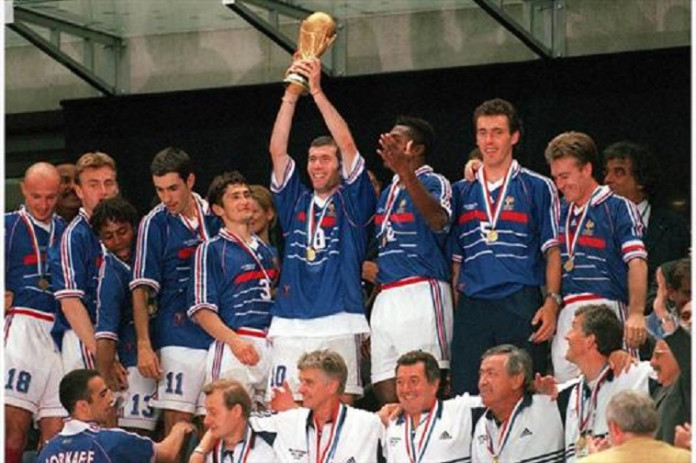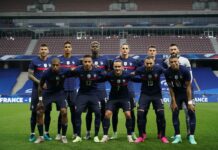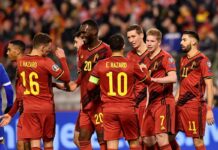The World Cups in 1986, 1990 and 1994 were won by Argentina, West Germany and Brazil respectively. Mexico 86 became Maradona’s tournament as the Argentine genius netted five goals while creating another five for his team during the course to victory.
West Germany avenged for their defeat in 1986 as they won their third title in 1990 beating the defending champions Argentina in an ill-tempered final. In 1994 Brazil tasted victory after 24 years under the captaincy of Dunga, beating Italy in a penalty shootout.
France wins the ‘Cup of Life’ – 1998
A team led by Didier Deschamps and spearheaded by Zinedine Zidane finally brought glory to the French nation on 12th July at Stade de France, as they beat a daunting Brazilian outfit inspired by Ronaldo.
The tournament in 1998 was hosted by France and for the first time the tournament was expanded to 32 teams. Ten stadiums in ten different cities were arranged for the big stage. Croatia, Jamaica, Japan and South Africa appeared for the first time in a World Cup.
Defending champions Brazil opened their campaign with a 2-1 win over Scotland but they were surprisingly defeated by Norway 2-1. Leading through a goal in the 78th minute, Brazil were heading for a certain win but Norway stormed with two late goals to stage a memorable comeback in World Cup history. The hosts topped their group with commanding wins against South Africa (3-0), Saudi Arabia (4-0) and Denmark (2-1). In group D, Nigeria caused a major upset by beating Spain 3-2 and eventually topping the group. Spain failed to qualify to the knockout despite thumping Bulgaria 6-1. Romania did a similar feat by beating England 2-1 and topping their respective group. Argentina qualified with a game to spare as they beat Japan and Jamaica with Batistuta scoring in both games. His hat-trick against Jamaica made Gabriel Batistuta the only person to score hat-tricks in consecutive World Cups. Newcomers Croatia gained the second place in their group mainly due to the heroics of Davor Suker.
The round of 16 saw a classic between Argentina and England. After Batistuta and Alan Shearer scoring through two penalties, stepped up young Michael Owen in the 16th minute to score an excellent goal with a wonderful solo run. But Argentina’s experience spoke when Javier Zanetti scored through a well mastered set piece following a free kick, leveling the scores just before half time. The turning point of the game occurred when David Beckham was red carded on retaliation for a foul by Argentine skipper Diego Simeone. The scores deadlocked after 120mins, saw a penalty shootout which was won 4-3 by Argentina, making goal keeper Carlos Roa the hero.
The quarterfinals featured another penalty shootout between France and Italy where yet again the Italians were undone similar to the 1994 finals. Brazil overcame Denmark 3-2 while Netherlands beat Argentina with a late goal, a moment of brilliance by Dennis Bergkamp. Surprise package Croatia beat Germany 3-0, qualifying for the semi finals. Later they won the third place, the best performance by a team appearing for the first time in a World Cup.
During the semi finals, Brazil overpowered Netherlands 4-2 in a penalty shootout after scores being leveled at 1-1, to meet France who ended Croatia’s dream run with a 2-1 win.
The Brazilians were the favourites to win consecutive titles as they were entertained by the host team France. The pre-match build up was dominated by the omission of Brazilian striker Ronaldo from the starting lineup only to be reinstated 45 minutes before kick-off. The final however was dominated by the French winning 3-0 against a formidable Brazilian line up. Zidane scored two similar goals with headers while Emmanuel Petit put the icing on the cake for the delighted home crowd at Stade de France. Croatian Davor Suker won the Golden Boot for his six strikes while Brazil’s Ronaldo won the Golden Ball.
Brazilian flare lights up the orient – 2002
It was redemption time for Brazil as they compensated for their defeat in 1998, by cruising to their fifth title beating Germany in the final. South Korea and Japan gained the opportunity to become the first Asian nations to stage the big event as they jointly hosted the 17th World Cup. It was the last World Cup to implement the ‘Golden Goal’ rule.
The co-hosts provided 10 venues each while the International Stadium in Yokohama was prepared for the grand final.
In the group stage, Denmark, Senegal and Uruguay forced the exit of defending champions France. They were eliminated following defeats to Senegal and Denmark and stalemate with Uruguay. Les Bleus, failed to score a single goal in the tournament, marking the worst performance by a defending title holder. The game between Uruguay and Senegal staged a classic where a comfortable 3-0 lead by Senegal was undone by a 3-3 comeback by Uruguay. The group stage also saw an 8-0 thumping on Saudi Arabia by Germany and the elimination of Argentina following a 1-0 defeat to England and a subsequent draw against Sweden.
In the knockouts, Turkey ended the Japan’s campaign with a 1-0 win while Senegal overcame Sweden following a golden goal by Henri Camara after the game ended 1-1 at fulltime. Brazil beat England 2-1 with a winning goal following a Ronaldinho free kick. South Korea entered the semi final beating Spain in a match which ended with much controversy as two goals by Spain were disallowed. However they became the first Asian team to reach the semi finals.
Germany edged pass South Korea in the semi finals with a goal by Michael Ballack to enter the final. But much to the despair, the German received a yellow card, allowing him to miss the final on accumulated yellow cards. Meanwhile Brazil beat Turkey 1-0 to enter their third consecutive final. In the third place match, Turkish striker Hakan Sukur scored straight from the kickoff in 10 seconds earning the fastest goal in World Cup history. They eventually won 3-2 beating co-hosts South Korea.
During the finals in Yokohama, two goals by Ronaldo secured the fifth title for Brazil as they claimed victory over Germany. Ronaldo also finished the tournament as the top scorer with eight goals while Oliver Kahn won the Golden Ball. Brazil became the first team since Argentina in 1986 to win the trophy without the need of a penalty shootout at some stage of the tournament. The ‘Selecao’ also became the first champion team to win every match at the tournament since 1970 and set a record for the highest aggregate goal difference (+14) for a World Cup winner. Skipper Cafu, who appeared in his third successive final, hoisted the FIFA World Cup trophy to the night sky of Yokohama, bringing relish to the football-crazy nation.
The world ‘makes friends’ as Italy wins their fourth – 2006
Olympic Stadium, Berlin on July 9th 2006 witnessed both the meltdown of a football legend Zinedine Zidane and an Azzurri triumph in a dramatic final decided by penalty kicks. Amidst the unconventional farewell for Zidane, there was much to admire about the Italians. Marcello Lippi’s men stood consistent throughout the tournament as ten players found the back of the net while the defense conceded just two goals, one an own goal and the other being a penalty. Led by defender Fabio Cannavaro, the Azzurri caught the eye with a midfield combination of Andrea Pirlo and Gennaro Gattuso and valiant raids of Gianluca Zambrotta and Fabio Grosso at the back.
‘A time to make friends’ became the official slogan when Germany hosted the World Cup in 2006 as twelve venues located in twelve different cities hosted fixtures.
The hosts opened their account with a 4-2 win over Costa Rica while Brazil, the holders won 1-0 against Croatia. In a 6-0 drubbing by Argentina on Serbia & Montenegro featured arguably the most perfectly constructed team goal in history where 24 passes ended with a splendid finish by Esteban Cambiasso. Italy passed through to the knockouts by topping their group while conceding just one goal (an own goal). During the match between Australia and Croatia, referee Graham Poll mistakenly inflicted three yellow cards to Croatia’s Josip Simunic.
The Swiss team met Ukraine in their round of 16, where after goalless 120mins, Ukraine won 3-0 on penalties. This made Switzerland the first team in a World Cup to fail to convert any penalties in a shootout. They also became the first team to exit a World Cup without conceding a single goal in the tournament, indeed the only nation ever to participate in a World Cup without conceding any goals. Brazil’s 3-0 win over Ghana included Ronaldo’s 15th career goal in World Cups surpassing Gerd Muller’s record of 14 goals. Dubbed ‘Battle of Nuremberg’, the bitter encounter between Portugal and Netherlands presented 16 yellow cards and 4 red cards by referee Valentin Ivanov , a record for a single game.
After beating Argentina in penalties, Germany met Italy in the semi finals. But it was heartbreak for the hosts as two late goals by Italy at extra time set them en route to the final. At the other end France, having beaten defending champions Brazil, beat Portugal 1-0 to reach their first final since 1998.
During the final, France opened the scoring through a penalty by Zidane, forcing Italy to concede only their second goal in the tournament. Marco Materazzi then leveled the scores in the 19th minute following an Andrea Pirlo corner. At extra time, Zidane was red carded for headbutting Materazzi in the chest while the match went into penalties. Converting all of their penalties the Italians won 5-3 and their first title in 24 years. Horacio Elizondo became the first referee to officiate both the opening and the final game of a World Cup. The tournament had a record number of yellow and red cards, 345 yellow and 28 red cards. Miroslav Klose won the Golden Boot for his five goals while Zidane won the Golden Ball.
Rejoice for Spain in the ‘Rainbow Nation’ – 2010
South Africa hosted the 2010 edition, becoming the first African nation to do so while ten venues were prepared for the big event.
In the opening round, however the host nation was knocked out following solitary a win, a draw and a defeat. United Sates topped the group ahead of England on superior goal difference while Germany lost 1-0 to Serbia despite topping their group. Spain lost their opening fixture to Switzerland. Defending champions Italy were knocked out from the first round after failing to win a single game.
The round of 16 encounter between England and Germany was marked by a controversial decision which disallowed a goal scored by Frank Lampard. England eventually lost the game 4-1. Having beaten England, Germany drubbed Argentina 4-0 in the quarterfinals before surrendering 1-0 to Spain in semis. Two-time champions Uruguay entered the semi finals for the first time in 40 years but they were eventually defeated 3-2 by Netherlands, paving the way for the Dutch to enter their third final and the first since 1978.
The Soccer City stadium in Johannesburg welcomed the final between Spain and Netherlands. The Dutch entered the final, with a 100% winning record alongside 12 goals, while the Spaniards came with 7 goals under their attacking force. The game was stalemate at full time, while midfielder Andres Iniesta scored in the 116th minute at extra time. It became hat-trick defeats for the Dutch, despite their anticipation to tame the losses from 1974 and 1978 finals. The trophy was handed to the goalkeeper-captain Iker Casillas who lifted it amidst the omnipresent hum of vuvuzelas. Thomas Muller won the Golden Boot while Diego Forlan was adjudged best player.






















